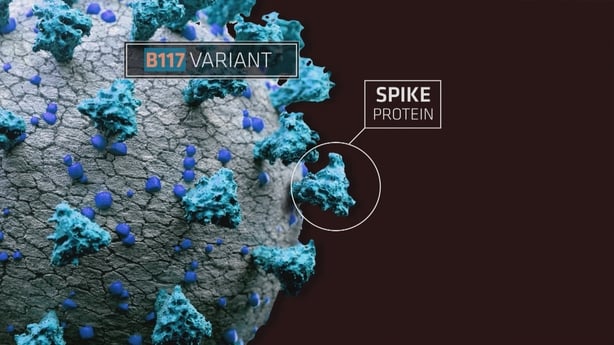New Variants of Covid-19 Copy
Emerging Variants
B.1.1.7 lineage (a.k.a. 20I/501Y.V1 Variant of Concern (VOC) 202012/01)
- First identified in Kent in UK during September 2020.
- First identified in Ireland on the 24th December 2020.
- This variant has 23 mutations, it’s most noticeable variant to do with the spike protein.
- This variant has a mutation in the receptor binding domain (RBD) of the spike protein at position 501, where amino acid asparagine (N) has been replaced with tyrosine (Y). The shorthand for this mutation is N501Y. This variant also has several other mutations, including:
- 69/70 deletion: occurred spontaneously many times and likely leads to a conformational change in the spike protein
- P681H: near the S1/S2 furin cleavage site, a site with high variability in coronaviruses. This mutation has also emerged spontaneously multiple times.
- ORF8 stop codon (Q27stop): mutation in ORF8, the function of which is unknown.
- People infected usually carry a higher viral load.
- Since December 20, 2020, several countries have reported cases of the B.1.1.7 lineage, including the United States and Canada.
- This variant is associated with increased transmissibility (i.e., more efficient and rapid transmission). It is 50-70% more transmissible.
- Currently there is no evidence to suggest that the variant has any impact on the severity of disease or vaccine efficacy.

B.1.351 lineage (a.k.a. 20H/501Y.V2)
- This variant has multiple mutations in the spike protein, including K417T, E484K, N501Y. Unlike the B.1.1.7 lineage detected in the UK this variant does not contain the deletion at 69/70.
- This variant was first identified in Nelson Mandela Bay, South Africa, in samples dating back to the beginning of October 2020, and cases have since been detected outside of South Africa.
- The variant also was identified in Zambia in late December 2020, at which time it appeared to be the predominant variant in the country.
- Currently there is no evidence to suggest that this variant has any impact on disease severity.
- There is some evidence to indicate that one of the spike protein mutations, E484K, may affect neutralization by some polyclonal and monoclonal antibodies.
P.1 lineage (a.k.a. 20J/501Y.V3)
- The P.1 variant is a branch off the B.1.1.28 lineage that was first reported by the National Institute of Infectious Diseases (NIID) in Japan in four travelers from Brazil, sampled during routine screening at Haneda airport outside Tokyo.
- The P.1 lineage contains 17 unique amino acid changes and 3 deletions.
- This variant contains three mutations in the spike protein receptor binding domain: K417T, E484K, and N501Y.
- There is evidence to suggest that some of the mutations in the P.1 variant may affect its transmissibility and antigenic profile, which may affect the ability of antibodies generated through a previous natural infection or through vaccination to recognize and neutralize the virus.
- A recent study reported on a cluster of cases in Manaus, the largest city in the Amazon region, in which the P.1 variant was identified in 42% of the specimens sequenced from late December. In this region, it is estimated that approximately 75% of the population had been infected with SARS-CoV2 as of October 2020. However, since mid-December the region has observed a surge in cases. The emergence of this variant raises concerns of a potential increase in transmissibility or propensity for SARS-CoV-2 re-infection of individuals.
Evidence suggests that these strains are far more transmissible than other variants of SARS-CoV-2.
Health officials now estimate that up to 60% of new cases of the illness in Ireland are due to the UK strain (B117) and is the new dominant variant, which may be one factor in record case figures and hospitalisations set this week.
In order to Stop the spread of Covid-19
It is important that you:
- Wash your hands properly and often.
- Practice social distancing.
- Cover coughs and sneezes.
- Wear a clean mask.
- Stay at Home if you feel sick or have any symptoms of Covid-19.
- Work from home as much as possible and Limit your social contacts.
- Follow the current Government restrictions.